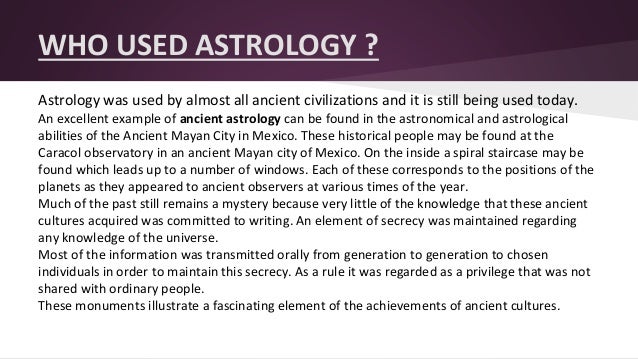42 astrology meaning in science
en.wikipedia.org › wiki › History_of_astrologyHistory of astrology - Wikipedia Astrology, in its broadest sense, is the search for human meaning in the sky; it seeks to understand general and specific human behavior through the influence of planets and other celestial objects. It has been argued that astrology began as a study as soon as human beings made conscious attempts to measure, record, and predict seasonal changes ... Is Astrology a Science? Let's Put an End to This Debate So, loosely, astrology can be defined as a form of divination which goes by the belief that life on Earth is guided by celestial alignments. In other words, the alignment of stars and planets at the time of your birth decides your nature and future.
astrologyk.comAstrology – Horoscope & Zodiac Signs, Dream Interpretation ... In the West, astrology most often consists of a system of horoscopes purporting to explain aspects of a person’s personality and predict future events in their life based on the positions of the sun, moon, and other celestial objects at the time of their birth. We offer you free horoscope, zodiac, dream interpretation and names meaning services.

Astrology meaning in science
Astrology Planets and Their Meanings, Explained - Astromix ... Modern astrology doesn't have that black-and-white approach. Instead of that, the planets reflect a human's soul in all its facets. For example, Saturn might have a negative influence on your natal chart and manifest itself in the fork of doubts or an inferiority complex. But it can also mean a firm resolve to reach one's goals. Astrology and Science - Introduction, Facts and Conclusion ... Astrology a science or superstition takes a unique route to arrive at specific conclusions. It's a pseudoscience that combines scientific and factual beliefs and practices. This methodology is a combination of contradictory and exaggerated claims that also lack openness and systematic practices. What is Astrology? Science, Myth, Superstition, or ... Astrology is not a science. According to Encyclopaedia Britannica, the definition of science is the following: "Science, any system of knowledge that is concerned with the physical world and its phenomena and that entails unbiased observations and systematic experimentation.
Astrology meaning in science. astrology | Definition, History, Symbols, Signs, & Facts ... Astrology is a method of predicting mundane events based upon the assumption that the celestial bodies—particularly the planets and the stars considered in their arbitrary combinations or configurations (called constellations )—in some way either determine or indicate changes in the sublunar world. ASTROLOGY: Superstition, Science, or Something Else ... Astrology became the province of emperors and kings and was used to rule their people, warn of revolt, famine and invasions. Advertisement. Jumping to the 20th century Medicine, Science, and Technology developed very sophisticated statistical models and experiments to explain phenomena. Astrology waned and went the way of old fashioned ... Astrology Facts for Kids | KidzSearch.com Astrology is the belief the positions of the stars and movements of the planets of the Solar System, and also asteroids and other stars, but not as much, have an influence on the events, lives, and behavior of people.. An astrologer looks at the planets' positions and tries to understand a person's character or tries to predict the future. Modern astrologers see astrology as a symbolic language. Astrology: Is it science? - The Mancunion Astrology studies the influence of the position of 'things' in the universe on an individual. 'Things' being celestial objects like the sun, the moon, constellations and other planets. Based off of this, some kind of emotional insight about the individual or the world can be interpreted. Makes sense, right?
› about › historyHistory of Astrology - American Federation of Astrologers Babylonian astrology was introduced to the Greeks early in the 4th century B.C. and, through the studies of Plato, Aristotle, and others, astrology came to be highly regarded as a science. It was soon embraced by the Romans (the Roman names for the zodiacal signs are still used today) and the Arabs and later spread throughout the entire world. Science Confirms Astrology! - Psychology Today From my limited knowledge, adjacent signs often have opposing, or at least unrelated, personalities, while science says that adjacent birth months are similar. And of course, no one thinks that the... Is Astrology Real? Here's What Science Says | Everyday ... Astrology is generally defined as the belief that astronomical phenomena, like the stars overhead when you were born or the fact that Mercury is in retrograde, have the power to influence the daily events in our lives and our personality traits. Is Astrology a Pseudoscience? - Learn Religions Astrology is a perfect example of a field characterized by extraordinary claims. If distant objects in space are able to influence the character and lives of human beings to the degree alleged, then fundamental principles of physics, biology, and chemistry which we already take for granted cannot be accurate.
ASTROLOGY | meaning in the Cambridge English Dictionary astrology definition: 1. the study of the movements and positions of the sun, moon, planets, and stars in the belief that…. Learn more. Understanding the Basics and Definition of Astrology Astrology is the study of patterns and relationships — of planets in motion, our birth chart, synastry with others, the make-up of elements — and using that knowledge as a tool to find meaning. Is Astrology a Science? It falls more in the category of metaphysics, the study of that which is beyond the physical. Astrology Definition & Meaning | Dictionary.com the study of the motions and relative positions of the planets, sun, and moon, interpreted in terms of human characteristics and activities the primitive study of celestial bodies, which formed the basis of astronomy Derived forms of astrology astrologer or astrologist, noun astrological (ˌæstrəˈlɒdʒɪkəl ), adjective astrologically, adverb en.wikipedia.org › wiki › Hindu_astrologyHindu astrology - Wikipedia Etymology. Jyotisha, states Monier-Williams, is rooted in the word Jyotish, which means light, such as that of the sun or the moon or heavenly body. The term Jyotisha includes the study of astronomy, astrology and the science of timekeeping using the movements of astronomical bodies.
12 Astrology Zodiac Signs Dates, Meanings and Compatibility According to a 1999 study, the word horoscope and astrology are the two most searched topics on the Internet. Astrology is considered to be both an art and a science. Astrology is art because interpretation is needed to bring the different aspects together and formulate an idea of the individual's character traits.
What is Astrology? Indian Vedic Astrology Definition and ... Astrology is a concept which basically derived from 12 houses, 7 planets and 2 Nodes and predictions are carved out on the basis of their transits in the sky. Every human has good and bad periods in their life which bring happiness and sadness to them.
Astronomy Definition & Meaning - Merriam-Webster The meaning of ASTRONOMY is the study of objects and matter outside the earth's atmosphere and of their physical and chemical properties. The Difference Between Astronomy and Astrology
Astrology Facilitates a Quest for Meaning that Science can ... Science Demands Objective Truth - Astrology Yields Subjective Truth Astrological Symbols Vary (Unscientifically) with Context and Consciousness The Participatory Experience of Astrology is not Predictable by Science Astrology Facilitates a Quest for Meaning that Science can't Recognize
Astrology and science - Wikipedia Astrology consists of a number of belief systems that hold that there is a relationship between astronomical phenomena and events or descriptions of personality in the human world. Astrology has been rejected by the scientific community as having no explanatory power for describing the universe.

The Qualities Of Elements Of Astrology | Astology Guru -Free Astrology Horoscope, Forecasts 2009
› astrologyAstrology (Signs, Chart, By Date of Birth) | Online Astrology ... Astrology, popularly known as jyotish in Indian culture, is derived from the early Latin word, Astrologia — astro meaning ‘star’ and logia standing for ‘the study of’ in Greek— that translates into ‘account of the stars’. Simply put, it is the study of the movement of stars, planets and other celestial bodies and how the same ...
Astrology vs Science Debate Which Do You Follow? - RDT ... Science says astrology lacks meaning and evidence due to its inability to stand the test of any evidential basis. On the one hand, astrology is routinely dismissed as nothing more than dramatized horoscopes that claim to predict individuals' futures and solely the fruit of the astrologist's imagination.
The Scientific evidence of Astrology - Kreately Read the below article to know the Science behind Astrology. In March 1951,an American radio engineer John H.Nelson discovered that there was a degradation in propagation of radio waves with respect to different position of planets and at different angles. Now,what has radio waves has to do with humans?
What is Astrology? - WorldAtlas Astrology is the study of the influence of stars and planets on human lives. There is a belief that the position of the sun, moon, planets, and other stars during a person's birth is very critical. Some people believe these cosmic objects define someone's personality, their romantic relations, and predict their economic successes.
› lilith-astrologyBlack Moon Lilith Placement Meaning | Ryan Hart Mar 15, 2021 · What Does Lilith in Astrology Mean? Lilith is not a planet or asteroid, but a lunar apogee (aka the Black Moon). It is a point in the sky where the moon would be farthest from Earth at the moment you were born. The moon orbits the Earth once every 28 days, but from time to time it moves out further from our planet.
Astrology - Wikipedia Astrology is a pseudoscience that claims to discern information about human affairs and terrestrial events by studying the movements and relative positions of celestial objects. Astrology has been dated to at least the 2nd millennium BCE, and has its roots in calendrical systems used to predict seasonal shifts and to interpret celestial cycles as signs of divine communications.
Why Science Says Astrology Lacks Meaning and Evidence ... There are many people who have been exposed to school-level science and who attempt to provide a rational defence of astrology. Their superficial argument of how planets influence human beings,...
Astrology: Is it scientific? - Understanding Science In some ways, astrology may seem scientific. It uses scientific knowledge about heavenly bodies, as well as scientific sounding tools, like star charts. Some people use astrology to generate expectations about future events and people's personalities, much as scientific ideas generate expectations.
Astrology and Modern shall see, astrology is neither a science nor an art but rather a system of magic divination based on ancient superstitions and the principle of correspondences. There can be no scientific validity in the methods, predictions or supposed 'influences' of astrology, almost by definition. It originated as a magical
Astrology: A Sacred Science - ZodiacSigns-Horoscope.com This article is going to expound more on the meaning of this Sacred Science and how it works. What is Astrology? According to astrologers, astrology is a Sacred Science. Astrology points to the fact that there is a relationship between astronomical phenomena and the different personalities that humans possess.
Astrology Definition & Meaning - Merriam-Webster In current use, astronomy is concerned with "the study of objects and matter outside the earth's atmosphere," while astrology is the purported divination of how stars and planets influence our lives. Put bluntly, astronomy is a science, and astrology is not. Examples of astrology in a Sentence
/114215801-56a0c4b85f9b58eba4b3a7e6.jpg)


/detail-of-sculpture-at-temple-of-ramesses-iii-585992706-5abba1a6c673350036ba1996.jpg)

/close-up-of-matzah-under-cloth-79253413-59e9175f03f4020011e56b88.jpg)
/GettyImages-996091258-5b91908846e0fb0050607b70.jpg)



0 Response to "42 astrology meaning in science"
Post a Comment